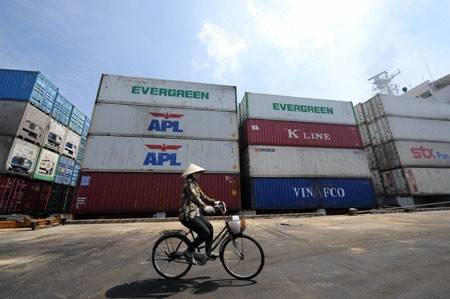You are here
Vietnam’s Exploding Reefers
Tue, 2011-11-08 22:01 — Kathy Gilbeauxby Ben Bland - Financial Times - November 7, 2011

It is thanks to the seemingly seamless international shipping network that Americans can buy computers made in China, Europeans can enjoy Argentine steak and people from all over the world can sustain themselves with rice, fish and coffee produced in Vietnam.
But the ease of transporting the humble twenty-foot container around the world means that problematic cargo in one port can swiftly become a global problem, as with a recent spate of exploding refrigerated containers traced to Vietnam.
From April to October, four refrigerated containers or “reefers” – used to transport fresh produce like seafood – that were repaired in Vietnam have exploded in Brazil, China and Vietnam, killing three port workers. The accidents have forced international shipping lines to take more than 1,000 reefers out of service and prompted stevedores in the US ports of Oakland and Seattle to refuse to unload containers from Vietnam.
Three of the explosions occurred in containers owned by Denmark’s Maersk, the world’s biggest container shipping company, and one in a reefer owned by France’s CMA CGM.
Both companies say the cause of the explosions remains a mystery. But Peter Smidt-Nielsen, general director of Maersk in Vietnam, suspects that it stems from contaminated gas that was put into the reefers’ cooling units in Vietnam between 30 March and 25 April, when a number of containers were repaired at Ho Chi Minh City’s Saigon New Port.
Smidt-Nielsen tells beyondbrics that the situation is “very unusual” although he knows of one similar case in the 1980s and another in the 1990s.
Maersk has grounded 844 of it 230,000 reefers until it has completed an investigation, while CMA CGM has grounded 332 and Singapore-based-APL has grounded around 100 as a precaution while insisting its containers are safe. Saigon New Port said it was also investigating the problem.
The Pacific Maritime Association, which negotiates labour contracts between dock-workers and shipping companies, said:
North American-based shipping industry officials, in conjunction with governmental agencies including the United States Coast Guard, have conducted a comprehensive review to determine the source of the problem and isolate and repair at-risk containers.
While Maersk’s trade volumes have not been affected, he says that some shipping lines have stopped taking reefers from Vietnam, possibly because of resistance from dock-workers in the US.
According to Saigon New Port, this has led to transportation delays and higher shipping costs, causing a “serious negative impact” on Vietnamese seafood exports, one of the country’s key sources of foreign exchange. The US is a major market for Vietnamese seafood and this is the peak season for seafood exports, a spokeswoman for the port said.
With Vietnam’s ports already suffering from congestion, power cuts and poor connecting infrastructure, this export-dependent nation could do without another problem like this.
So could shipping companies, which are already battling falling profits because of the darkening global economic outlook.
Coming after major disruptions to international car and electronics manufacturers from natural disasters in Thailand and Japan, it is another reminder of the fragilities of the global production and transport systems.
http://blogs.ft.com/beyond-brics/2011/11/07/vietnams-exploding-reefers/#axzz1d2zvBsYJ

Recent Comments